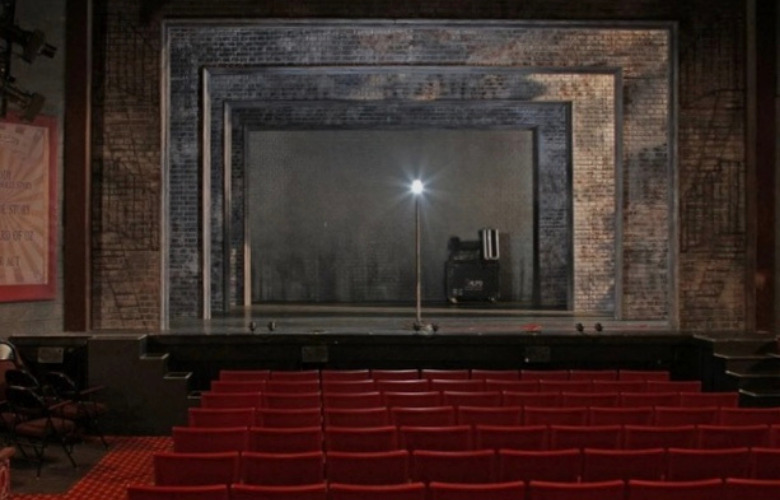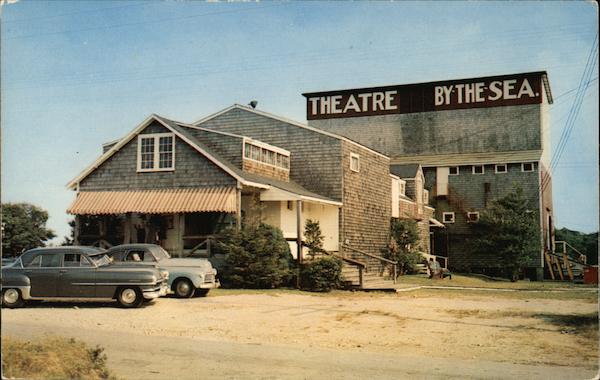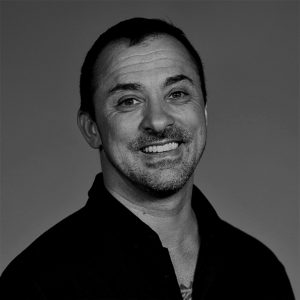
Gail Malatesta is a US American stage manager with 30 years of experience. She has worked for a plethora of theatres over the years. During the last 10 years also for large corporations such as Universal Studios, Disney, and Royal Caribbean. We went on a trip down memory lane and chatted about a couple of Gail’s very first experiences in the entertainment industry…
Beginning of the 90s, I went to Boston University to get my BFA in stage management. This was a rare opportunity, because SM courses of study were not yet widely available. People had BAs in theatre, but only two schools back then offered a BFA in stage management. Boston University was one of them.
In the first year, you took classes from any other theatre-related major, because stage management has to be the hub.
So I did everything. I took acting classes, sewed costumes, operated lighting boards, etc. etc. It was a well-rounded education.
I also added a whole bunch of liberal arts classes that supported my major. I took a tap-dancing class for example. Not really to learn how to tap-dance.
Rather, my goal was to record what the other students were doing and to notate tap-dance.
My teacher allowed me to do both, the actual dancing and the notation.
We could do internships in theatres and get college credits for them. But I ended up not getting credit for any of my internships.
One of my internships was at Merrimack Repertory Theatre in Lowell, Massachusetts. It had a thrust stage and the set of our 9-scene play featured a giant door unit. This unit moved into different positions during the performance to signify going back in time.
It was 1990 and I was 21 years old. Backstage, all was very low-brow. There was no automation. The only way to move the door was for someone to come out and push it. So, they built me a seat to sit inside the unit.
I would sit there during the whole play with a headlamp, reading plays to pass the time, then get up at the right moment and push.
Then I would sit down again and keep reading until my next cue.
This was the whole internship.
They paid me 50 USD plus housing in a decrepit old house which was supposedly the union house of Equity. But, Equity members refused to live there. The house was empty. However, they still put me in the attic and wouldn’t let me move into a better room.
The attic was spooky, dark, and filthy. I remember my dad coming in and saying, “This place is a tinder box.” He was really concerned. A day later he showed up with a giant bag of rope. He tied a knot every foot and tied the rope to the leg of my bed, closest to the small window.
So that, if a fire broke out, I could throw it out the window, climb down, and make my escape. I have kept the bag of rope to this day.
When we were striking the set, Merrimack Rep rented a Ryder truck. The next day, the SM and I were the only ones showing up. We drove the Ryder truck from the theatre to the local dump. They weighed the truck and then we drove straight up to the enormous garbage heap. We walked through all the slimy crap, held our breaths, and threw the set onto the heap. We had to do three trips. This might have been the lowest point of my career.
I ended up doing an extra semester of SM work to finally get credit.
During the rehearsals for one production at our school, I remember having an argument with the artistic director about Styrofoam.
He was a fine guy but had a bit of a chip on his shoulder. I set up the coffee corner for the rehearsal and put a pile of Styrofoam cups there as well. The AD came up to me and said, “No Styrofoam. Go up to the art department and borrow some mugs.”
I did and put a name tag on each of them.
A few days later, he picked up his mug and said, “What is this?”
Me: “That’s your mug.”
AD: “It’s dirty. An Equity stage manager would never have the director’s mug dirty.”
Me: “Yes, they would. I worked in Equity theatre. They won’t clean your mug.”
And I walked away.
He was so angry, he actually went to the school administration and tried to get me expelled over the mug.
The play was Noises Off by Michael Frayn. It’s in 3 acts. About a troupe of actors who are putting on a show. It’s a snapshot of theatrical life. About personalities and relationships, and how they evolve and disintegrate.
The set had 2 levels and 7 doors. And the entire set turned. In act 1, you had the front view. In act 2, the back view to symbolize being backstage. And, in act 3, you were back to the front view.
Act 2 was kind of strange because of seeing the back of the 7 doors…
We had cue lights on every door.
With 7 doors constantly being in use, I was already cue-lighting like a mad woman. Then the artistic director decided there was not enough tension…
Part of the play (and what made the audience laugh because by then they knew the play) was that the actors missed their entrances through the doors. The artistic director decided, when someone missed their entrance, the cue light on that door had to blink until the actor finally stepped through.
I ended up running the 7 doors and blinked the lights.
It worked, in terms of creating more tension on stage. But it was mad.
At the end of tech, I left my booth and went on stage. All of a sudden, I heard the artistic director, “Gail!”
And I thought, “What now?”
“Great work tonight.” He said. “Excellent work!”
I said “Thanks.” And felt as light as a feather.
From that moment on, he loved working with me. It took all that time and me almost breaking my fingers for him to realize that I was capable.
It’s a theatre that presents stage productions only in the summer. The name combines the season with the tradition of staging shows by a resident company, reusing stock scenery and costumes.
My first Summer Stock was in a converted barn. I was the girly girl. I wore short skirts, lots of lipstick, and high heels.
So, I was out there with my cute little outfit, in the middle of New Hampshire, in a barn. And the first thing we did was paint the entire barn. Everyone was convinced I wouldn’t last a week. Two ladies took a photo of me while I was painting. They too were convinced I would be the first to leave.
But I got a paint smock from the costume department and painted on. I thought this was the best thing ever and was so happy to be there.
I was up at 8 am. Did my intern duties, cleaned the patron bathrooms, worked in the shop until noon, then rehearsals, then shows. It was total immersion theatre. And I was there the whole time in my heels with lipstick. Looking like I had just stepped out of a shop in New York. Out in the country, while I got bitten by black flies.
It was a tough job. The only time off was Wednesdays, from 9am to noon, after opening night. People got fired all the time, quit, discussed. So many were coming and going, you couldn’t even keep track.
People ran screaming from this much theatre.
Amazingly, I found I was in my element. I was all over it and loved it. For me, it was the best thing since sliced bread. It was the summer camp I never went to.
After I called the final show of the summer, the musical director walked up to me with a 20 dollar bill.
Me: “What’s that?”
MD: “The first day, we bet you wouldn’t last… and here you are. The last person out.”
He put the 20 USD in my bra and walked away.
For the first Equity show I ever did, I had union credit because of union internships. But, at first, I didn’t get a union contract because I was 2 credit points shy of getting my union card.
Instead, the Theatre by the Sea in Rhode Island hired me as a non-equity assistant for the summer.
I ran their auditions in New York and made sure everything was on time and efficient. They were really impressed. So, after a week, I got a call and they offered me a different contract.
I was still young, beginning of my twenties, and the first weekend of my new contract was also my college graduation. I asked for that Sunday off to drive to Boston and get my degree.
They said, “Ok, but don’t tell anybody, because you look older than you are and we don’t want anyone to know you are so young.”
I thought that was a bit odd… but ok.
The first show I did for Theatre by the Sea was The Boyfriend. A musical. The director of this show and I really clicked. Everything was great.
Then, on opening night, I was at the bar after the show and the director came up to me, “I have to tell you, you are really good.”
I said, “Thanks, that’s flattering.”
And he went, “The producer was wrong. He told me you are really young and don’t know your stuff and that he got stuck with hiring you. He told me to watch out.”
I just thought, wow, how incredible for someone to hire me and then sabotage me in such a way at the same time.
That same season, we did another musical called “One Mo’ Time.” It was a cabaret-style, Vaudevillesque show.
When we were in tech, I worked with a lighting designer I hadn’t met yet. He probably was the fastest LX designer I’ve ever met.
There I was, madly writing cues, and he kept saying, “You’ll press GO here.”
I looked at him. “Why do you keep saying that? I am not pressing the GO button. I am calling the show.”
LX designer: “Oh no, you are running the light board.”
Me: “No I’m not.”
LX designer: “Oh yeah, you are.”
He called a break and asked for the producer to join us.
Me: “I’m not running the board.”
Producer: “Of course you are running the board. Equity SMs always run the board.”
I then literally quoted the Equity book at him to prove that was not the case.
He went and called the union and had Equity talk to me to convince me to run the light board. I took the phone in a private room and ended up telling them, “You are my union. You have to stand up for me. Get off this phone, call the producer back, and tell him to find someone else to run the board.”
The producer was pissed, but he had to find a guy to run the light board.
It was a bumpy year.
Both actors, playing Hoke and Daisy were a bit forgetful.
The Theatre by the Sea is just off the beach by the sea. We had a hurricane come up the coast (the big one well-known from the movie “The Perfect Storm”) and for a little while we had to evacuate.
After three days of evacuation we went back to tech-ing our play.
In Matunuck, Rhode Island, there is not much besides a seafood shack and the theatre. At this point, Rhode Island and the Eastern Seaboard were still without power.
So, the whole state had no power but we were still mounting the show.
We drove an 18-wheeler behind the theatre which was basically fitted out to be an enormous mobile generator.
We were getting to tech and there was the same lighting designer again, saying, “You press GO.”
Me: “You are saying it again.”
LX designer: “No, it’s a play now, not a musical. You are running the board.”
Me: “No, I’m not.”
We went through the whole exercise all over again. He called the producer, who then called Equity, who then talked with me.
The producer claimed hardship, and that they had to evacuate, which was why they had no one else to run the board. But that was BS. They hadn’t booked anyone. So, I just told Equity, “He’s not telling you the truth. I’m not running the light board.”
Again, Equity got back to the producer and he had no choice but to hire an extra guy.
We opened and I called the play from the orchestra pit because the old lady kept forgetting her lines. This way, I was close and able to feed her the lines if she needed me to.
I called the show through the still lingering storm. Every now and then you would see the lights begin to fizzle. Soon after, the generator would trip and the lights would go out.
Each time, I’d have to quickly inform the audience. Then I would climb out of the pit, run to the back, crank the thing, and re-start the generator. Then I’d run back to the pit and resume the show.
One day, I had to stop 4 or 5 times. The fifth time was during the final scene when Hoke visits Daisy in the nursing home. The lights went “bzzzzz” and went out. I jumped up, and informed the audience, “Ladies and Gentlemen…” This time I had a walkie talkie with me and quickly got on it, asking for the ushers to open all exit doors.
They did. Sunlight bled in. We could see and continued with natural light.
A few minutes later, in the final moment, Hoke was feeding Daisy pie and the lights were supposed to fade to black. With all the doors open they, of course, couldn’t.
So I stood up with my microphone and said “And… Blackout!” Then I started clapping to signal to the audience that we were really finished. Everyone started applauding. The actors just stared at me like “What on Earth is she doing?”

Keep Your Cool Backstage as a Stage Manager: 12 Insights
My Turbulent Graduation from the HK Academy for Performing Arts


Liam Klenk was born in Central Europe and has since lived on four continents. Liam has always been engaged in creative pursuits, ranging from photography and graphic design, to writing short stories and poetry, to working in theatre and shows. In 2016, Liam published his first book and memoir, 'Paralian'.
Read Full Profile© 2021 TheatreArtLife. All rights reserved.

Thank you so much for reading, but you have now reached your free article limit for this month.
Our contributors are currently writing more articles for you to enjoy.
To keep reading, all you have to do is become a subscriber and then you can read unlimited articles anytime.
Your investment will help us continue to ignite connections across the globe in live entertainment and build this community for industry professionals.